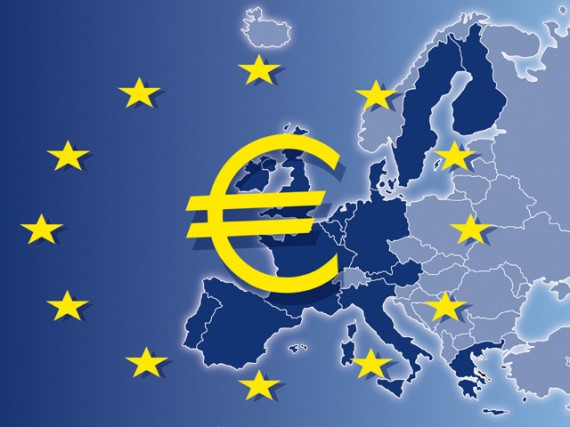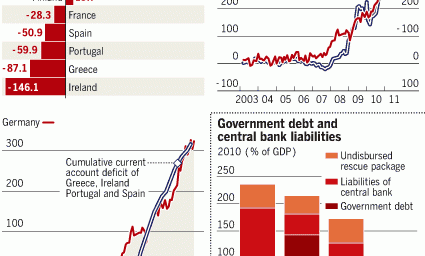Eurozone Only Days Away From Collapse?
That’s what Wolfgang Münchau at The Financial Times says:
Technically, one can solve the problem even now, but the options are becoming more limited. The eurozone needs to take three decisions very shortly, with very little potential for the usual fudges.
First, the European Central Bank must agree a backstop of some kind, either an unlimited guarantee of a maximum bond spread, a backstop to the EFSF, in addition to dramatic measures to increase short-term liquidity for the banking sector. That would take care of the immediate bankruptcy threat.The second measure is a firm timetable for a eurozone bond. The European Commission calls it a “stability bond”, surely a candidate for euphemism of the year. There are several proposals on the table. It does not matter what you call it. What matters is that it will be a joint-and-several liability of credible size. The insanity of cross-border national guarantees must come to an end. They are not a solution to the crisis. Those guarantees are now the main crisis propagator.
The third decision is a fiscal union. This would involve a partial loss of national sovereignty, and the creation of a credible institutional framework to deal with fiscal policy, and hopefully wider economic policy issues as well. The eurozone needs a treasury, properly staffed, not ad hoc co-ordination by the European Council over coffee and desert.
As Stephen Green notes, it’s hard to see Europeans ever agreeing to this, never mind agreeing to it anytime within the next two weeks, month, or however much longer they might actually have.







The insanity of this is that the German position is that the under-capitalized southern states should adjust their policies to be more like those of Germany. Their problem isn’t just one of policy. Greece was a Turkish colony until 180 years ago. Italy, Spain, and Portugal have similar stories.
If a European fiscal union is to work the highly capitalized and developed states (like Germany) must agree to send a part of their GDP to the less capitalized and developed ones (like Greece), somewhat as California, New York, and Illinois send a portion of their GDPs to Wyoming and Mississippi. That’s what the Germans will never agree to.
It seems to support my thought all along, that Europe has to either Federalize or become cleanly separate nations. They don’t get to have it both ways.
The other thought that I’ve been tossing around lately in my admittedly amateur at analyzing Europe brain is this one — let’s say Europe somehow makes it through this. The cost will be borne most substantially by the Germans. One wonders what political concessions they might want in return.
@Doug Mataconis:
Let’s hope it’s not living space ; – )
@Doug Mataconis:
. Shouldn’t they? Germany was also the primary beneficiary of the EMU as they spent 2001-2005 violating the Maastricht Treaty via illegal levels of deifict spending to boost their economy, and using their position to force a trade imbalance on southern Europe. At every step since the Greek crisis began last year Germany has made the situation worse by unending quest to bail out its banks.
I don’t feel sorry for the German eurobosses; the German people are the only ones for whom I have any sympathy, but then they should have done a better job of reigning in their politicians.
Ben,
As someone who thought the whole European “unity but not really unity” plan was doomed from the start, I’ve got to say there are a lot of guilty players here. The Greek economy for one is simply unsustainable and I don’t blame the Germans or the French for imposing conditions for additional aid.
Fiscal union is not the solution. It may work in continental countries because there is a large immigration between the states/provinces and because there are several limitations to the power of these political divisions.
That´s not the case of Europe.
@Doug Mataconis:
The problem is the “aid” won’t help. The Greek economy is contracting faster than its rulers can cut spending and the additional taxes being proposed will only make this situation worse. Greece’s debt has exploded since it enacted austerity measures demanded by the EMU core nations. Germany isn’t doing what it’s doing because it will help the Greeks, it’s doing it to protect German banks from the consequences of Greece’s necessary default. As for France, just wait a few weeks: they’ll end up in Germany’s crosshairs soon enough.
@Ben Wolf:
That’s exactly my point. Financial “union” without political (and cultural) unity is doomed to fail at some point.
@Doug Mataconis: Well you’re damned point is 100% correct.
Christ, my spelling sucks today. I’m forced to beg forgiveness.